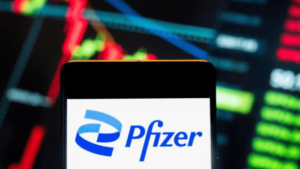
Pfizer’s Earnings Boost Sparks Optimism
Pfizer Inc. recently reported better-than-expected earnings for the quarter. Cost-cutting measures and strong demand for certain products drove this positive performance. This article delves into the details of Pfizer’s financial report, the factors behind its success, and what this means for the company’s future. Pfizer’s Earnings Boost Sparks Optimism
Quarterly Earnings Breakdown
Pfizer’s latest financial results exceeded analysts’ expectations. Revenue for the quarter reached $19 billion, also above estimates. Key contributors to this strong performance were Pfizer’s innovative drugs and vaccines. The company saw robust sales in its oncology and immunology divisions.

Cost-Cutting Measures
A crucial factor in Pfizer’s improved financial performance was its focus on reducing expenses. The company implemented several cost-cutting initiatives. These included streamlining operations and reducing workforce expenses. Pfizer also optimized its supply chain to lower production costs. These efforts have significantly improved the company’s profit margins. As a result, Pfizer was able to report higher-than-expected earnings. The company continues to prioritize efficiency and cost management.
Increased Full-Year Outlook
Pfizer has revised its full-year financial outlook upwards. The company now expects total revenue for the year to be between $78 billion and $80 billion. This is an increase from the previous estimate of $76 billion to $78 billion. The EPS guidance has also been raised, with Pfizer expecting a range of $4.20 to $4.30. This optimistic forecast is based on strong demand for the company’s key products. The company also anticipates continued growth in its pipeline of new drugs.
Strong Product Performance
Several of Pfizer’s products performed exceptionally well during the quarter. The oncology portfolio, including drugs like Ibrance and Xtandi, saw significant sales growth. The immunology segment, with products like Xeljanz and Enbrel, also contributed positively. Additionally, Pfizer’s rare disease treatments, including Vyndaqel and Vyndamax, showed strong demand. These products are essential for patients with rare, often life-threatening conditions. Their success underscores Pfizer’s focus on addressing unmet medical needs.
COVID-19 Vaccine Impact
Pfizer’s COVID-19 vaccine, Comirnaty, continues to be a significant revenue driver. The vaccine has been widely distributed globally. It has played a crucial role in the fight against the pandemic. In the latest quarter, Comirnaty sales contributed significantly to Pfizer’s revenue. The company has also been working on developing updated versions of the vaccine. Pfizer’s partnership with BioNTech has been central to the vaccine’s success. The two companies continue to collaborate on vaccine development and distribution.
Research and Development Investments
Pfizer remains committed to innovation through significant investments in research and development (R&D). This investment is aimed at expanding Pfizer’s pipeline of new drugs. The company is working on several promising candidates in various therapeutic areas. These include oncology, immunology, and infectious diseases. Pfizer’s R&D efforts are critical for its long-term growth. The company is also exploring new technologies, such as mRNA, for future treatments.
Market Reaction and Stock Performance
Investors reacted favorably to the company’s strong performance and increased outlook. Pfizer’s shares rose by several percentage points. The market’s reaction reflects confidence in the company’s strategy and future prospects. Analysts have also revised their target prices for Pfizer’s stock upwards. The company’s strong financial position and robust product portfolio are key factors in this positive outlook.
Challenges and Risks
Despite the positive results, Pfizer faces several challenges and risks. One concern is the potential for declining demand for COVID-19 vaccines. As the pandemic situation evolves, demand for boosters and new versions of the vaccine may decrease. Additionally, Pfizer faces competition from other pharmaceutical companies. The market for many of its key products is highly competitive. There are also risks associated with drug development. Not all of Pfizer’s R&D investments may result in successful products.
Strategic Initiatives and Future Plans
Pfizer has outlined several strategic initiatives for the future. The company plans to continue its focus on innovation and expanding its product portfolio. Pfizer is also exploring strategic partnerships and acquisitions. These could enhance its capabilities and market reach. The company is particularly interested in expanding its presence in emerging markets. Pfizer’s management has emphasized the importance of adaptability. The company aims to respond quickly to changes in the healthcare landscape.
Corporate Social Responsibility
Pfizer is also committed to corporate social responsibility (CSR). The company has launched several initiatives to support global health. These include efforts to increase access to medicines and vaccines in underserved regions. Pfizer is also working on sustainability initiatives. Pfizer’s CSR efforts are an essential aspect of its corporate identity.
Conclusion
Pfizer’s recent earnings report highlights the company’s strong financial performance and strategic execution. The company’s ability to beat earnings estimates and raise its full-year outlook reflects its resilience and adaptability. While challenges remain, Pfizer’s focus on innovation and cost management positions it well for future growth. The company’s commitment to corporate social responsibility and global health is also noteworthy. As Pfizer continues to navigate the evolving healthcare landscape, it remains a key player in the pharmaceutical industry.








